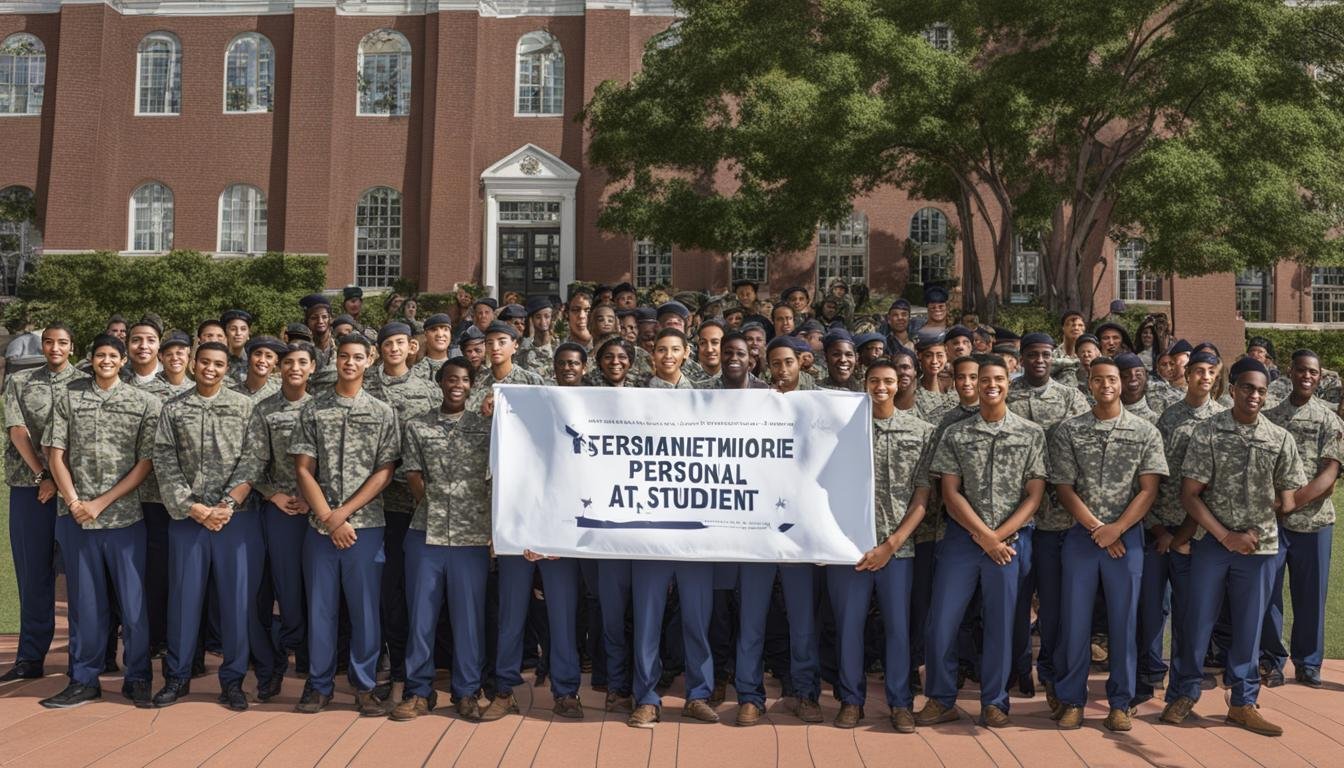A study conducted at Columbus State University found that their Veteran Peer Mentor Program has been instrumental in helping military veterans successfully transition from the military to college. The program connects student-veterans with veteran peer mentors who provide guidance, support, and resources to help them navigate the challenges of college life. These mentors, who have already gone through the transition themselves, understand the unique needs and experiences of student-veterans.
The program offers a wide range of support services, including help with class navigation, counseling, tutoring, and accessing disability benefits. The mentorship program has significantly contributed to the overall success and satisfaction of student-veterans at Columbus State University.
Key Takeaways:
- Veteran peer mentoring programs assist student-veterans in navigating the challenges of college life.
- Mentors who have gone through the military-to-college transition provide valuable guidance and support.
- Support services offered include class navigation, counseling, tutoring, and accessing disability benefits.
- These programs contribute to the overall success and satisfaction of student-veterans.
- Columbus State University’s Veteran Peer Mentor Program is a successful example of such a program.
Benefits of Veteran Peer Mentoring Programs in College
Veteran peer mentoring programs in college offer a multitude of benefits for student-veterans. These programs provide structured support and guidance to help them navigate the challenges they may encounter during their transition from military to civilian-student life.
One of the key advantages of these programs is the availability of peer mentors who have gone through similar experiences. These mentors understand the unique needs and perspectives of student-veterans, and they can offer valuable insights and advice. They serve as a go-to resource, assisting student-veterans with various aspects of college life, such as finding classes, accessing counseling services, or connecting with tutoring programs.
“Having a veteran peer mentor was invaluable to my success in college. They helped me navigate the complexities of campus life and provided a sense of belonging in a new environment.”
Moreover, veteran peer mentoring programs foster a strong sense of camaraderie and community among student-veterans. By connecting with fellow veterans who have shared experiences, student-veterans can build a support network that understands their unique challenges and triumphs. This sense of belonging not only enhances their well-being but also contributes to their academic success.
Research has shown that veteran peer mentoring programs also contribute to higher student-veteran retention rates. By providing the necessary support and resources, these programs help student-veterans overcome obstacles and stay motivated to continue their educational journey beyond the first semester.
Table: Comparison of Veteran Peer Mentoring Programs
| Program | Benefits | Availability |
|---|---|---|
| Program A | Personalized guidance and support | Available at universities nationwide |
| Program B | Access to academic resources and tutoring | Offered at community colleges |
| Program C | Opportunities for networking and professional development | Available at select universities with strong veteran support services |
It is clear that veteran peer mentoring programs in college provide substantial benefits for student-veterans. They offer tailored support, foster a sense of community, and contribute to higher retention rates. By implementing and expanding these programs, colleges and universities can ensure that their student-veterans receive the necessary resources and support to thrive academically and personally.
Finding Veteran Peer Mentoring Programs in College
When it comes to finding veteran peer mentoring programs in college, there are several resources available to support military veterans in higher education. Many colleges and universities understand the unique needs of student-veterans and have established dedicated departments or offices to assist them. One of the primary places to start is the Office of Military Enrollment and Adult Learners, where you can find information about mentorship programs specifically designed for student-veterans. These programs connect student-veterans with veteran peer mentors who have gone through the transition themselves and can offer valuable guidance and support.
Another valuable resource for student-veterans is the Veterans Administration (VA). The VA provides a range of services and support programs, including access to caregiver support programs and the VA Caregiver Support Line. Local Caregiver Support Coordinators can assist student-veterans in finding suitable mentorship programs that align with their needs and goals. Additionally, Veterans Resource Centers on campus are excellent places to inquire about mentorship opportunities. These centers often have information about various programs available, as well as staff who can guide student-veterans in the right direction.
It’s crucial for student-veterans to take advantage of these mentorship resources and programs on campus. Not only do they provide the necessary support and guidance for a successful transition to college life, but they also offer opportunities to connect with other like-minded individuals who have similar experiences. By participating in veteran peer mentoring programs, student-veterans can build a strong support network, gain valuable insights, and enhance their overall college experience.
| Mentorship Resource | Contact Information |
|---|---|
| Office of Military Enrollment and Adult Learners | Phone: 123-456-7890 Email: militaryenrollment@university.edu |
| Veterans Administration (VA) Caregiver Support Line | Phone: 1-800-555-1234 Email: supportline@va.gov |
| Local Caregiver Support Coordinator | Contact information available through the VA |
| Veterans Resource Center | Phone: 987-654-3210 Email: veteranscenter@university.edu |
By reaching out to these resources and programs, student-veterans can find the mentorship and support they need to navigate the challenges of college life and thrive in their educational pursuits.
How Do Peer Mentoring Programs for Veterans in College Differ from Academic Advising Programs?
Peer mentoring programs for veterans in college differ from traditional academic advising programs in several ways. While veteran academic advising programs focus on general academic guidance, peer mentoring programs provide tailored support from fellow veterans who understand the unique challenges and experiences of military life.
Conclusion
Veteran peer mentoring programs in college play a crucial role in providing the necessary support and resources for military veterans pursuing higher education. These programs aim to enhance the academic success and overall well-being of student-veterans, ensuring a smooth transition from military to civilian-student life.
By connecting student-veterans with veteran peer mentors, colleges and universities create a supportive network where individuals with shared experiences can offer guidance, understanding, and encouragement. The mentorship programs provide invaluable knowledge and firsthand advice on navigating the challenges of college, including class navigation, accessing counseling or tutoring services, and understanding disability benefits.
Moreover, these programs foster a sense of camaraderie and community among student-veterans, addressing their unique needs and creating a supportive environment that promotes academic growth and personal development. By investing in veteran peer mentoring programs, educational institutions demonstrate their commitment to providing college support for military veterans, ensuring that they receive the assistance and resources they need to thrive in their educational pursuits.
For student-veterans seeking mentorship opportunities, they can reach out to their respective Veterans Resource Centers or inquire through the Office of Military Enrollment and Adult Learners. Additionally, resources from the Veterans Administration (VA) and local Caregiver Support Coordinators can help student-veterans find suitable mentorship programs that align with their needs and goals.



